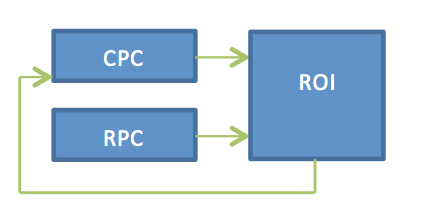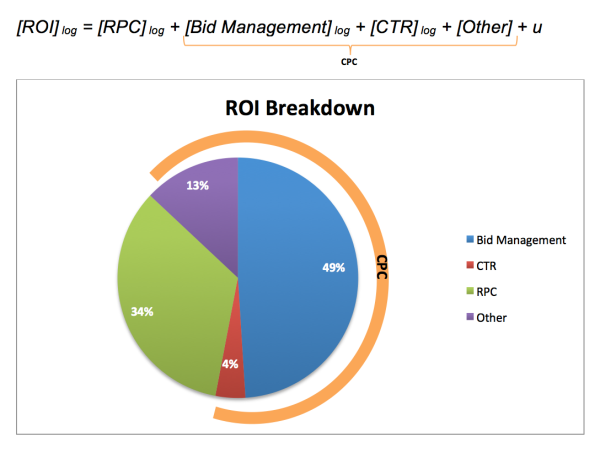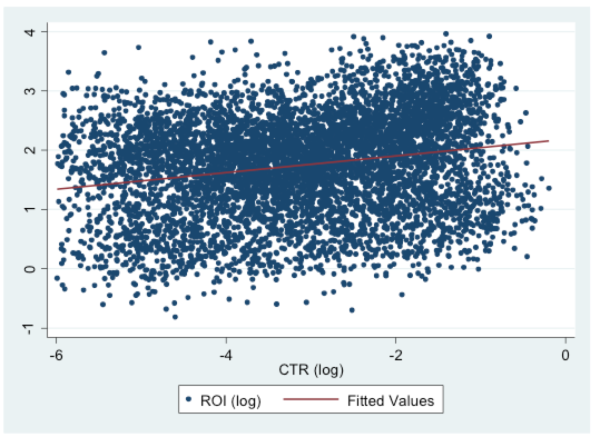The Most Important KPI For A Performance Marketer
Many performance marketers continue to consider click-through rate (CTR) as a key performance indicator of their search campaigns’ effectiveness and evolve their PPC optimization strategy around that. At the end of the day, what matters most is achieving the best ROI given your business objectives and budget, and you might optimize directly to CTR or […]
Many performance marketers continue to consider click-through rate (CTR) as a key performance indicator of their search campaigns’ effectiveness and evolve their PPC optimization strategy around that.
At the end of the day, what matters most is achieving the best ROI given your business objectives and budget, and you might optimize directly to CTR or ROI or a combination of success metrics to achieve that.
In order to have the best optimization strategy for your SEM campaigns, it is important to understand and quantify the influencers of ROI.
The Two Extreme Optimization Strategies
There are two types of strategies performance marketers consistently use as their campaign optimization strategy:
1) Optimizing To A CTR Goal
One of the main factors influencing Quality Score (QS) is CTR, which affects your cost-per-click (CPC) and in turn affects your ROI. An increase in QS due to a boost in CTR would lower CPC and improve ROI.

2) Optimizing To An ROI Goal (Revenue-Per-Click & Cost-Per-Click)
Direct optimization to revenue or a conversion metric is a common strategy amongst performance marketers. Making sure an intelligent bid management is in use will be crucial to your campaign’s success.

While perhaps no marketer purely optimizes to CTR or ROI, they tend to skew towards one of these camps. Each method has its pros and cons. A CTR strategy will get you more clicks but does not guarantee the highest ROI. A purely ROI approach will get you the highest ROI but you potentially lose out on customers early in the sales funnel who might eventually convert.
ROI Breakdown
ROI equals Revenue-Per-Click (RPC) over Cost-Per-Click (CPC). Data analyzed from over two dozen advertisers using econometric methods (a simplified version of the equation is shown below) shows that 34% of ROI is influenced by RPC and 66% by CPC.
Bid management is by far the most important influencer of ROI. Forty-nine percent (49%) of ROI is influenced by bid management, 13% by other factors (i.e., marketplace, seasonality, etc.), and 4% by CTR. The data show the importance of having an intelligent bid management strategy in place for your SEM campaigns. But, does this mean a CTR maximizing strategy is a wasted effort?

A Deeper Dive Into The Relationship Between ROI & CTR
Previous studies have looked at the relationship between CTR & ROI by purely relying on correlations. A correlation analysis alone cannot determine the effects of CTR on ROI, and a more robust statistical technique is required to answer that question. These techniques enable us to control for all the factors that can potentially influence ROI.
From the chart below, we do see a relationship between the CTR & ROI — but not a very strong one.

Applying statistical modeling techniques will allow us to quantify any statistically significant relationship between the two if it exists.
In this model, I control for position, CPC, industry, and bid management differences across the different advertisers in the data in addition to CTR.
The results show that there is a statistically significant relationship between CTR and ROI; but in terms of impact, it’s quite small. For a 10% increase in CTR, expect to see a 1.2% increase in ROI. This means that if you increase your CTR from 10% to 11% for a campaign with an average ROI of $5, the ROI will increase to $5.06 due to the improvements made in CTR.
Key Takeaways For Performance Marketers
- Campaign managers should utilize both strategies above in optimizing their campaigns; main focus should be on ROI but do not completely ignore CTR
- 49% of ROI is influenced by bid management; intelligent bidding is integral to a campaign’s success
- CTR does have a small but statistically significant impact on ROI; a 10% change in CTR affects ROI by 1.2%
In Summary
Focus on optimizing your SEM campaigns for ROI but keep an eye on CTR. There is no need to purely optimize to CTR as it influences only 4% of ROI; but, it is important to account for it in your longer term strategy and make sure healthy CTR rates are met and maintained.
Intelligent bid management heavily influences ROI and is absolutely necessary to ensure your ROI goals are met.
Contributing authors are invited to create content for MarTech and are chosen for their expertise and contribution to the search community. Our contributors work under the oversight of the editorial staff and contributions are checked for quality and relevance to our readers. MarTech is owned by Semrush. Contributor was not asked to make any direct or indirect mentions of Semrush. The opinions they express are their own.
Related stories